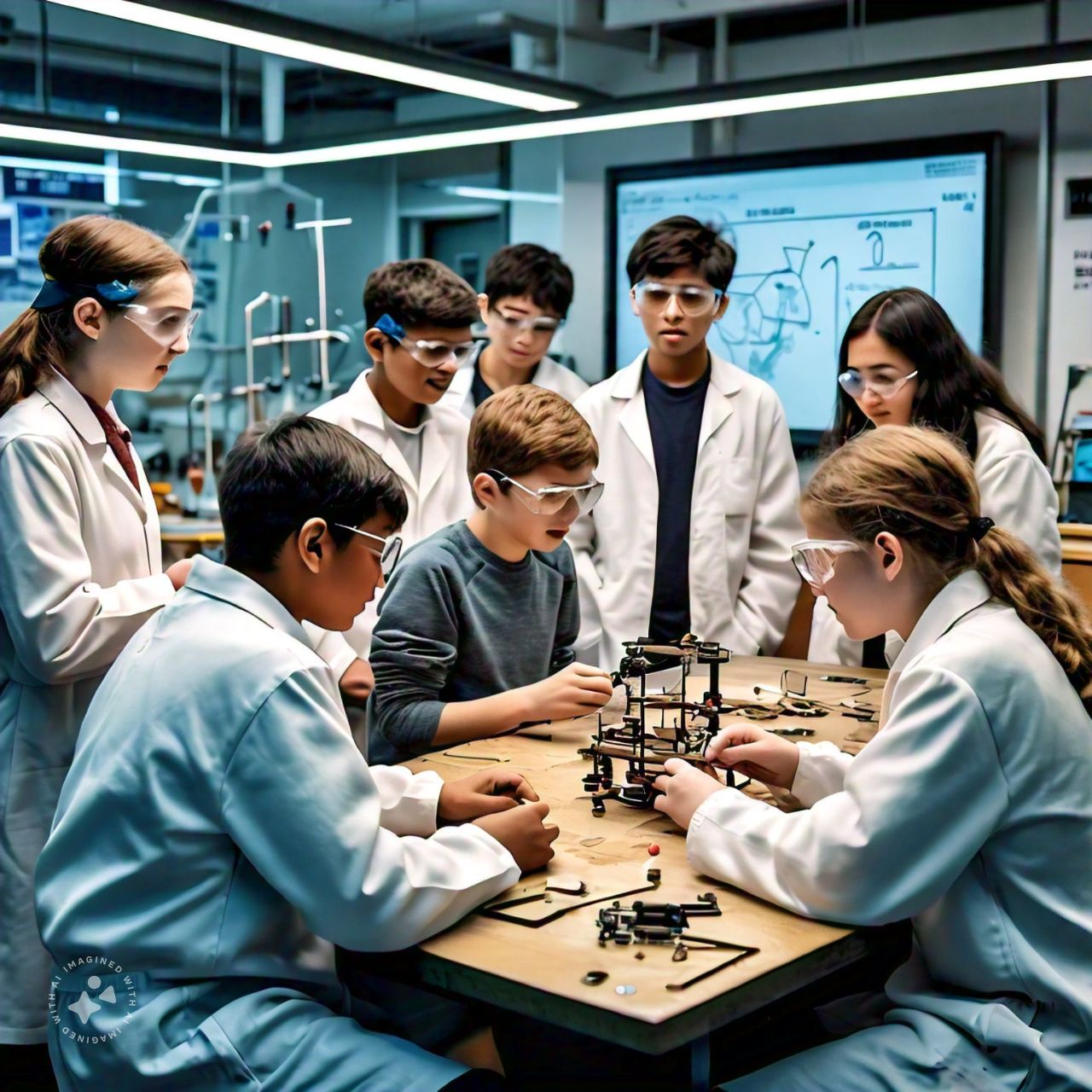Introduction
In today’s fast-paced and ever-changing world, the ability to lead and innovate is more important than ever. Schools have a critical role in shaping the next generation of leaders by equipping students with the skills and mindset necessary to navigate complex challenges and drive positive change. At Delhi World Public School, the Top CBSE Schools in Greater Noida where building leadership skills in students not only prepares them for future success but also fosters a culture of innovation and responsibility that can have a lasting impact on society.
The Importance of Leadership Skills in Education
Leadership skills are essential for students as they prepare to enter a world that demands creativity, critical thinking, and effective communication. While academic knowledge remains important, the ability to lead, inspire, and innovate is what sets future leaders apart. By developing leadership skills, students learn to take initiative, work collaboratively, and make informed decisions—all of which are crucial for personal and professional success.
Key Leadership Skills for Students
-
Communication Skills
– Effective communication is at the heart of leadership. Students must learn to express their ideas clearly, listen to others, and engage in meaningful dialogue. These skills enable them to build strong relationships, resolve conflicts, and inspire others to take action.
-
Decision-Making Abilities
– Leaders are often required to make tough decisions under pressure. Developing strong decision-making skills helps students analyze situations, weigh the pros and cons, and choose the best course of action. This skill is vital for problem-solving and achieving goals.
-
Teamwork and Collaboration
– Leadership is not about working alone; it’s about guiding and motivating a team toward a common goal. Students must learn to work collaboratively, respecting diverse perspectives and leveraging the strengths of others. Teamwork fosters a sense of community and shared responsibility.
-
Critical Thinking and Problem-Solving
– Innovation stems from the ability to think critically and solve problems creatively. Students need to develop critical thinking skills that allow them to approach challenges with an open mind, question assumptions, and devise innovative solutions.
-
Empathy and Emotional Intelligence
– Understanding and managing emotions, both their own and others, is crucial for effective leadership. Empathy enables students to connect with others, build trust, and create a positive and inclusive environment. Emotional intelligence helps them navigate interpersonal dynamics and lead with compassion.
-
Resilience and Adaptability
– The ability to bounce back from setbacks and adapt to changing circumstances is essential for leadership. Students must develop resilience to overcome challenges and maintain a positive outlook. Adaptability allows them to remain flexible and open to new ideas and opportunities.
-
Integrity and Ethical Leadership
– True leaders act with integrity and uphold ethical standards. Students need to learn the importance of honesty, transparency, and accountability in their actions. Ethical leadership builds trust and credibility, both of which are critical for long-term success.
Strategies for Developing Leadership Skills in Students
Schools can adopt various strategies to foster leadership skills in students, preparing them to become future innovators and change-makers.
-
Incorporating Leadership Education into the Curriculum
Leadership education can be integrated into the curriculum through dedicated courses, workshops, and activities that focus on leadership development. Schools can offer classes on communication, ethics, and decision-making, providing students with the theoretical knowledge and practical skills needed to lead effectively.
-
Encouraging Student-Led Initiative
One of the most effective ways to develop leadership skills is by giving students the opportunity to lead. Schools can encourage student-led initiatives, such as clubs, organizations, and community service projects. These initiatives allow students to take ownership of their ideas, plan and execute activities, and develop leadership abilities in a real-world context.
-
Promoting Extracurricular Activities
Extracurricular activities, such as sports teams, debate clubs, and arts programs, provide valuable opportunities for students to develop leadership skills. Participating in these activities helps students learn to work with others, manage responsibilities, and lead by example. Schools should encourage students to get involved in activities that align with their interests and passions.
-
Offering Leadership Workshops and Seminars
Schools can organize leadership workshops and seminars led by experienced leaders from various fields. These events provide students with insights into different leadership styles, challenges, and strategies. Workshops can include interactive activities, such as role-playing, case studies, and group discussions, that allow students to practice and refine their leadership skills.
-
Mentorship Programs
Mentorship is a powerful tool for developing leadership skills. Schools can establish mentorship programs that pair students with teachers, alumni, or professionals who can offer guidance, support, and inspiration. Mentors can help students set goals, navigate challenges, and build confidence in their leadership abilities.
-
Encouraging Reflection and Self-Assessment
Self-awareness is a key component of effective leadership. Schools should encourage students to engage in reflection and self-assessment, helping them identify their strengths, weaknesses, and areas for growth. Journaling, peer feedback, and self-evaluation tools can support students in their leadership journey.
-
Fostering a Culture of Innovation and Entrepreneurship
Innovation and entrepreneurship are closely linked to leadership. Schools can create a culture that encourages creativity, experimentation, and risk-taking. By providing opportunities for students to develop and pitch their ideas, schools can cultivate an entrepreneurial mindset that empowers students to lead and innovate.
The Role of Teachers and Educators in Leadership Development
Teachers and educators play a crucial role in nurturing leadership skills in students. Their guidance, support, and encouragement are essential in helping students develop the confidence and competence needed to lead.
-
Modeling Leadership Behavior
Teachers can model leadership behavior by demonstrating qualities such as integrity, empathy, and effective communication in their interactions with students. By setting a positive example, educators inspire students to adopt similar behaviors in their own leadership roles.
-
Providing Constructive Feedback
Constructive feedback is vital for leadership development. Teachers should provide timely and specific feedback that helps students understand their strengths and areas for improvement. Encouraging a growth mindset, where mistakes are seen as opportunities for learning, can boost students’ confidence and motivation to lead.
-
Creating a Supportive Learning Environment
A supportive learning environment is key to fostering leadership skills. Teachers can create a classroom culture that values collaboration, respect, and open communication. By encouraging students to share their ideas, take risks, and support one another, educators help build the foundation for effective leadership.
-
Recognizing and Celebrating Leadership Achievements
Acknowledging and celebrating students’ leadership achievements can motivate them to continue developing their skills. Schools can recognize student leaders through awards, certificates, and public recognition at assemblies or events. Celebrating leadership achievements reinforces the importance of leadership and encourages other students to aspire to similar roles.
Challenges in Leadership Development
While developing leadership skills in students is essential, it is not without challenges. Schools must navigate these challenges to ensure that all students have the opportunity to develop as leaders.
-
Balancing Leadership Development with Academic Responsibilities
Students often face the challenge of balancing leadership roles with their academic responsibilities. Schools must provide support and guidance to help students manage their time effectively and prioritize their commitments. Flexibility in scheduling and workload can also help students maintain a healthy balance.
-
Addressing Diverse Leadership Styles
Leadership is not a one-size-fits-all concept; students may exhibit different leadership styles based on their personalities and strengths. Schools must recognize and value diverse leadership styles, providing opportunities for all students to lead in ways that align with their natural abilities. This inclusivity ensures that leadership development is accessible to every student.
-
Overcoming Barriers to Participation
Not all students may feel confident or capable of taking on leadership roles. Schools must actively work to overcome barriers to participation, such as social anxiety, lack of experience, or fear of failure. Providing a supportive environment, mentorship, and opportunities for gradual involvement can help students build the confidence needed to step into leadership roles.
-
Ensuring Equity and Inclusion
Leadership opportunities should be accessible to all students, regardless of their background, abilities, or socioeconomic status. Schools must ensure that leadership programs and initiatives are inclusive and equitable, offering support to students who may face additional challenges in accessing these opportunities.
Conclusion
At Delhi World Public School, the Best CBSE School in Greater Noida where building leadership skills in students is a critical component of education that prepares them to become future innovators and change-makers. By developing key skills such as communication, decision-making, teamwork, and empathy, students are equipped to lead effectively in a variety of contexts. Schools play a vital role in fostering these skills through curriculum integration, extracurricular activities, mentorship, and a supportive learning environment.
Despite the challenges, the benefits of developing leadership skills in students are far-reaching. By empowering students to lead, schools are not only preparing them for personal and professional success but also contributing to the development of a generation of leaders who will drive positive change in their communities and beyond.
Leadership development is an investment in the future. By prioritizing leadership education and creating opportunities for students to lead, schools are preparing the innovators, entrepreneurs, and leaders of tomorrow who will shape the world for the better.

